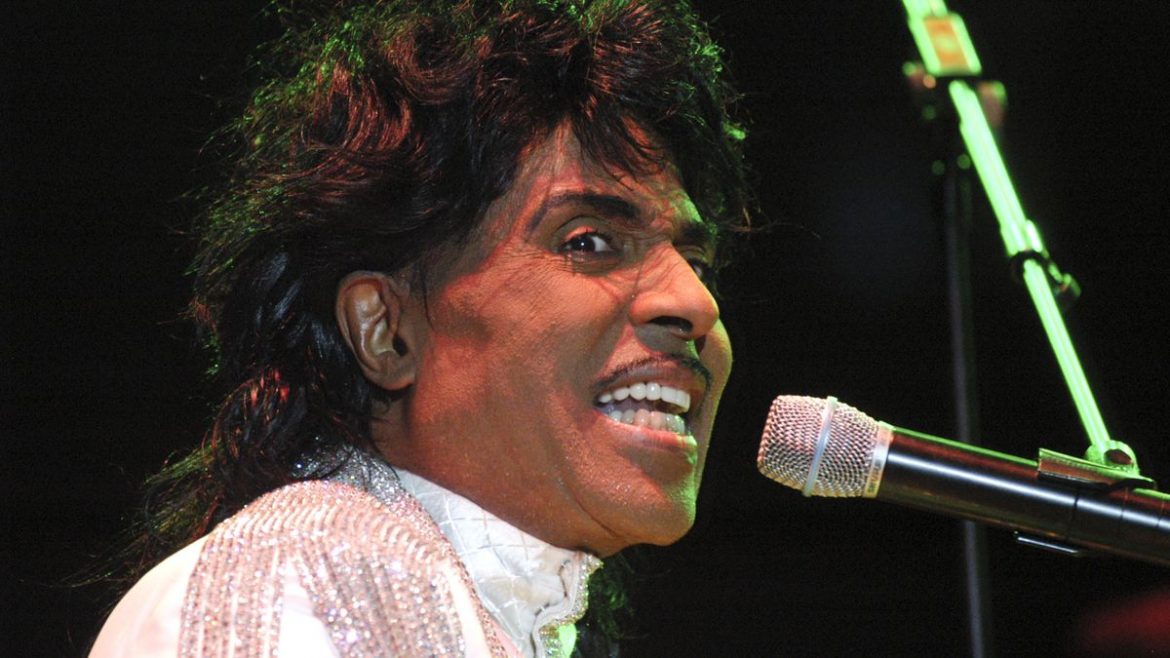
Richard Wayne Penniman (December 5, 1932 – May 9, 2020), better known as Little Richard, was an American singer, songwriter, and musician.
Richard Wayne Penniman was born in Macon, Georgia, and was the third of 12 children to Charles “Bud” Penniman and Leva Mae. His father was a church deacon, a brick mason, sold bootlegged moonshine and owned a nightclub called the Tip In Inn.
As a child Richard Penniman was nicknamed “Lil’ Richard” by his family because of his small and skinny frame.
Little Richard’s family was very religious and joined various churches, with several family members becoming ministers. He enjoyed the Pentecostal churches the most, because of their charismatic worship and live music.
Little Richard’s initial musical influences were gospel performers such as Brother Joe May, Sister Rosetta Tharpe, Mahalia Jackson, and Marion Williams.
Little Richard was an influential figure in music and culture for seven decades and was celebrated by many as “The Innovator”, “The Originator”, and “The Architect of Rock and Roll”. His most celebrated songs were from the mid-1950s, when his charismatic showmanship and dynamic music, laid the foundation for rock and roll as we know it. His innovative emotive singing and crazy, up-tempo, rhythmic music also played a key role in the formation of several other music styles, including soul and funk, he influenced many singers and musicians in musical styles from rock to hip hop and his music shaped rhythm and blues for generations to come.
In 1955 “Tutti Frutti”, possibly one of the greatest rock n roll songs of all time, and one of Little Richard’s signature songs, became an instant hit and crossed over to the pop charts in both the United States and the United Kingdom. His next hit single, “Long Tall Sally” in 1956, reached number 1 on the Billboard Rhythm and Blues Best-Sellers chart, followed by a succession of 15 hit singles in less than three years, and his performances during this time led to integration in his audience between white Americans and African Americans.
In 1962, during a five-year period in which Little Richard abandoned rock and roll music for born-again Christianity, concert promoter Don Arden persuaded him to tour Europe with the Beatles opening for Little Richard on some tour dates, capitalizing on his huge popularity. Little Richard advised them on how to perform his songs and taught Paul McCartney his distinctive, legendary vocalizations.
Little Richard was one of the first, if not the first, crossover black artists, reaching audiences of all races. His music and concerts broke the color line, and drew blacks and whites together despite attempts to keep them segregated.
Many of his contemporaries recorded covers of his works, including Elvis Presley, the Everly Brothers, Chuck Berry, Jerry Lee Lewis, Buddy Holly, Bill Haley, Gene Vincent and Eddie Cochran.
Elvis Pressley was particularly taken by Little Richard’s music and style, and covering four of his songs on his first two albums in 1956. In 1969 Elvis Presley told Little Richard that his music was an inspiration to him and that Little Richard was “the greatest”.
During the 1950s rock and roll scene, Little Richard was a teetotaler abstaining from alcohol, cigarettes, and drugs and he often fined bandmates for drug and alcohol use during this time. However, by the mid-1960s Little Richard began and smoking cigarettes and marijuana and drinking heavily. By 1972, he had developed an addiction to cocaine, and by 1975, he had developed addictions to both heroin and PCP. His drug and alcohol use affected his professional career and personal life, and he once said that he did whatever he could to use cocaine, and admitted that his addictions to cocaine, PCP and heroin were costing him as much as $1,000 a day.
During the 1980s and 1990s, Little Richard officiated at celebrity weddings and funerals, and used his experience and knowledge as a minister and elder statesman of rock and roll to preach at funerals of musical friends such as Wilson Pickett and Ike Turner.
Little Richard was honored by many institutions. In 1986 he was inducted into the Rock and Roll Hall of Fame as part of its first group of inductees, he was also inducted into the Songwriters Hall of Fame, and received a Lifetime Achievement Award from the Recording Academy and a Lifetime Achievement Award from the Rhythm and Blues Foundation.
In 2010, “Tutti Frutti” was included in the National Recording Registry of the Library of Congress which stated that Little Richard’s “unique vocalizing over the irresistible beat announced a new era in music”.
The National Museum of African American Music awarded Little Richard a Rhapsody & Rhythm Award in 2015 for his influence in the creation of many popular music genres and helping to bring an end to the racial divide on the music charts and in concert in the mid-1950s, changing American culture for ever.
On May 9, 2020, Little Richard died at the age of 87 at his home in Tullahoma, Tennessee from bone cancer, after a two-month illness.
Check out Little Richard on Amazon

